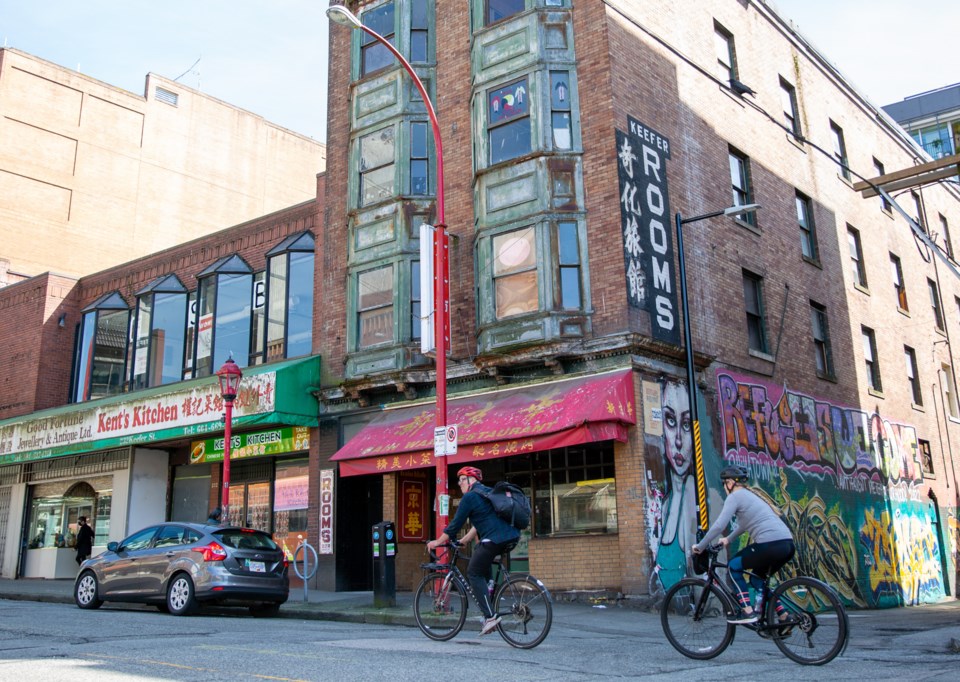The average rent in privately owned single-room-occupancy (SRO) hotels in Vancouver is $681 this year — an increase of 21 per cent, or $120 over what it was in 2019, according to the city’s downtown core low-income housing report.
The report, which goes before city council this week, said when a calculation of average rent is done without including what tenants pay at Chinese benevolent society-run SROs or private hotels operated by non-profits, the cost is actually $736 per month.
The city based the calculation on rent data collected from 62 privately owned and operated SROs, five private hotels operated by a non-profit and seven buildings owned and operated by Chinese benevolent societies.
Rent data from another 18 buildings would have been included but staff was hampered in its research by a lack of contact or refusal by building managers to answer some or all of the survey questions.
“For the open buildings where complete surveys could not be collected, unit information was derived from previous surveys and city records, but the buildings are excluded from vacancy rate and rent figures,” the report said.
At the same time, staff was able to conclude there were 815 private SRO rooms renting at $500 or less in the downtown core. That included 398 rooms in 11 privately owned and operated SROs, 338 rooms in five privately owned and non-profit operated SROs.
An additional 79 rooms were in six Chinese Benevolent Society buildings.
“Although a large portion of the private SRO stock continues to be more affordable than average rents in a new market rental studio in the same neighbourhood, the term ‘low-Income housing’ for SROs is becoming increasingly inaccurate as average rents escalate far beyond the reach of low-income residents,” the report said.
Single people on income assistance
The majority of SRO tenants are single people receiving income assistance.
As a result, rents have traditionally been set at or around the shelter component of income assistance, which has remained at $375 per month for 16 years. Yet, since 2003, the number of privately owned and operated rooms at $375 decreased from 1,700 to 52.
In the last three years, the number of rooms renting at twice the shelter rate ($700-plus) increased by 18 per cent, from 769 to 911 rooms, according to the report.
Christopher Wall owns eight SRO buildings in Vancouver, including the 98-room West Hotel, the 76-room Hotel Empress and 88-room Avalon Hotel. The Keefer Rooms, United Rooms, the Arlington, Laurel Apartments and the former York Rooms are his other buildings.
In an interview in 2021, Wall said the average rent across his properties, which total about 500 rooms, is $595 per month. But some of his tenants, he added, have paid the $375 shelter rate for 15 years.
At the time, Wall pointed to the challenge of keeping rents low while his cost for building materials, property taxes, insurance, fire prevention and pest control services continued to rise.
Shelter rate will increase to $500
In March, the B.C. government announced an increase to the shelter rate from $375 to $500 for a single individual, which will take effect in July 2023.
The report said the increase will reduce the housing burden for tenants in private SROs, “but not significantly, as average rents still exceed the new shelter component of income assistance.”
Added to that reality is that existing private SRO stock is becoming increasingly vulnerable to disinvestment and rising rents, according to the report, which also pointed out a rise in fires at SROs and buildings ordered closed because of unsafe conditions.
“A trend that is likely to continue given the aging infrastructure of the stock,” said the report, which referenced the now city-owned Balmoral and Regent hotels purchased from the Sahota family after years of neglect and disrepair.
The city and BC Housing are working on a plan to renovate the Regent and demolish the Balmoral — currently underway and expected to be completed by the end of the year — to add new social housing.
The city recently purchased two sites on East Hastings Street adjacent to the Balmoral as part of the redevelopment. At one time, the hotels contained a combined 300 rooms.
Patricia Hotel sold for $63.8 million
The private SRO stock in Vancouver has decreased from 7,830 rooms in 1994 to 3,305 rooms in 2023. The Downtown Eastside has the highest rate of loss, although some of those rooms have been acquired by governments and non-profits.
Since 2019, seven private SROs with more than 400 rooms have been brought under government or non-profit ownership, and an additional three commercial hotels with more than 200 rooms were acquired by BC Housing to operate as non-market housing.
One of those hotels was the 195-room Patricia Hotel at 403 East Hastings St., which the B.C. government purchased for $63.8 million; the price included the building’s large parking lot.
Also since 2019, seven purpose-built non-market projects with 541 units have been completed, of which at least 400 units are renting at shelter rates. An additional 1,480 purpose-built non-market housing units are currently approved or under construction in the downtown core.
The city report is scheduled to go before council Tuesday (May 30).





